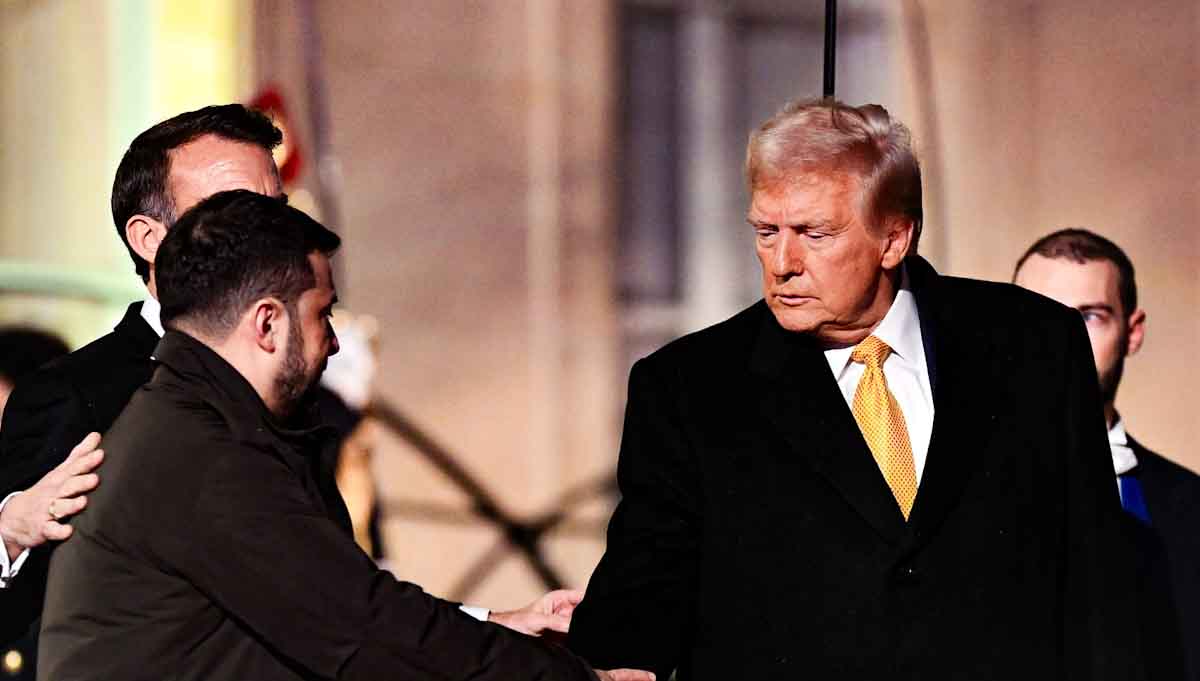Former U.S. President Donald Trump has once again made headlines with his controversial remarks, this time targeting Ukrainian President Volodymyr Zelenskyy.
In a recent speech, Trump referred to Zelenskyy as a “dictator,” accusing him of holding onto power without elections and suggesting that the ongoing war in Ukraine benefits his administration.
The statement has sparked significant debate, drawing criticism from both sides of the political spectrum and fueling discussions on social media platforms like X (formerly Twitter).
— Donald J. Trump (@realDonaldTrump) February 19, 2025
Trump’s Remarks on Zelenskyy
During a campaign rally, Trump questioned Zelenskyy’s legitimacy, stating that he had postponed Ukraine’s elections due to the ongoing war. “They call him a hero, but he’s a dictator. There are no elections, and he keeps asking for money,” Trump said.
He implied that Ukraine’s continued request for U.S. aid was part of a broader strategy to sustain Zelenskyy’s grip on power rather than focus on achieving peace.
Trump also reiterated his belief that he could end the Russia-Ukraine war within 24 hours if re-elected. This claim has been met with skepticism, as he has yet to provide any concrete details on how he would achieve such a rapid resolution.
His comments have led to speculation about whether he would push Ukraine to negotiate with Russian President Vladimir Putin, potentially on terms favorable to Moscow.
Zelenskyy’s Response
Following Trump’s remarks, Zelenskyy responded in an interview, dismissing the accusations and warning that Trump’s stance could embolden Russian aggression. “If anyone calls me a dictator, they are repeating Kremlin propaganda,” Zelenskyy stated.
He defended his decision to delay elections, explaining that holding a national vote amid an ongoing invasion is logistically and legally impossible under Ukrainian law.
Zelenskyy also extended an invitation to Trump, suggesting that if the former U.S. president truly believes he can end the war in a day, he should visit Ukraine and attempt to do so.
“If he has a plan, let him come here and show the Ukrainian people how he would achieve peace in 24 hours,” Zelenskyy said, adding that Ukraine would not accept any peace deal that compromises its sovereignty or territorial integrity.
Political and International Reactions
Trump’s statements have drawn mixed reactions from U.S. politicians. Many Republicans who support continued aid to Ukraine have distanced themselves from his remarks.
Senate Minority Leader Mitch McConnell, who has been vocal about backing Ukraine, stated that “supporting Ukraine is in America’s best interest” and warned that cutting off aid would only strengthen Putin’s position.
On the other hand, some Trump-aligned Republicans, including members of the MAGA movement, have echoed his concerns about U.S. taxpayer money being sent overseas without clear accountability. Critics argue that the Biden administration has failed to set clear objectives for its involvement in the war.
Internationally, European leaders have also weighed in. French President Emmanuel Macron and German Chancellor Olaf Scholz reaffirmed their support for Ukraine, emphasizing the importance of standing against Russian aggression.
NATO Secretary-General Jens Stoltenberg indirectly criticized Trump’s remarks, stating that “democratic leaders defending their nations from invasion cannot be compared to dictators.”
The Role of Social Media and Public Opinion
Trump’s comments quickly went viral on X, trending under hashtags like #TrumpZelenskyy and #UkraineAid. While many of Trump’s supporters agreed with his perspective, arguing that U.S. aid to Ukraine needs greater scrutiny, others pointed out that labeling Zelenskyy a dictator plays into Russian propaganda.
Political analysts suggest that Trump’s rhetoric is aimed at energizing his base ahead of the 2024 election. By questioning Ukraine’s leadership and foreign aid policies, he appeals to voters who are skeptical of America’s international commitments. However, critics argue that such remarks risk damaging U.S. credibility among its allies.
Donald Trump’s characterization of Zelenskyy as a dictator has added another layer of controversy to the ongoing debate over U.S. involvement in Ukraine.
While his remarks resonate with his supporters, they have also sparked backlash from international leaders and policymakers who argue that undermining Ukraine’s leadership only benefits Putin.
As the 2024 U.S. presidential election approaches, Trump’s stance on foreign policy, particularly regarding Ukraine, will likely remain a key issue in the political discourse.
